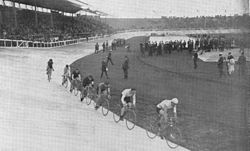
Keirin – literally "racing cycle" – is a form of motor-paced cycle racing in which track cyclists sprint for victory following a speed-controlled start behind a motorized or non-motorized pacer. It was developed in Japan around 1948 for gambling purposes and became an official event at the 2000 Olympics in Sydney, Australia.
A velodrome is an arena for track cycling. Modern velodromes feature steeply banked oval tracks, consisting of two 180-degree circular bends connected by two straights. The straights transition to the circular turn through a moderate easement curve.

The 1900 Summer Olympics were held as part of the 1900 World's Fair, during which many cycling events were contested. The IOC website currently affirms a total of 3 medal events, after accepting, as it appears, the recommendation of Olympic historian Bill Mallon regarding events that should be considered "Olympic". These additional events include the men's points race. Thus, three cycling events are considered Olympic events. These three competitions were held between 9 September and 16 September 1900. The cycling part of the World's Fair included 250 competitors, 160 of them French. In the sprint and 25 km events, 72 competitors, all men, from seven nations competed.

The men's sprint was one of the three cycling events, all track cycling, now regarded as "Olympic" on the Cycling at the 1900 Summer Olympics programme. It was held on 11 September and 13 September. The sprint, a 2000-metre race with 1000-metre heats, was conducted in four rounds. 69 of the 72 cyclists competed in the sprint, including cyclists from all six competing nations. The event was won by Albert Taillandier of France, with his countryman Fernand Sanz in second place. John Henry Lake of the United States won the nation's first cycling medal with his bronze.
The men's 660 yards was one of seven track cycling events on the Cycling at the 1908 Summer Olympics programme. It was the shortest of the events. The 1908 Games was the only time when the 660 yards event was part of the Olympic cycling program. Each nation could enter a maximum of 12 cyclists.
The men's 5000 metres was one of seven track cycling events on the Cycling at the 1908 Summer Olympics programme. Its distance was the median of the individual event distances. Each nation could enter up to 12 cyclists.
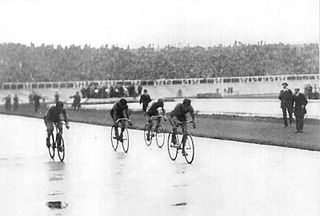
The men's 100 kilometres was one of seven track cycling events on the Cycling at the 1908 Summer Olympics programme. Its distance was the longest of the individual event distances. A challenge cup was presented by the Prince of Wales to the winner. There were 43 competitors from 11 nations. Each nation could enter up to 12 cyclists. The event was won by Charles Henry Bartlett of Great Britain, with his countryman Charles Denny finishing second. Octave Lapize earned bronze, making France the only nation to have medalists at both appearances of the 100 kilometres race.
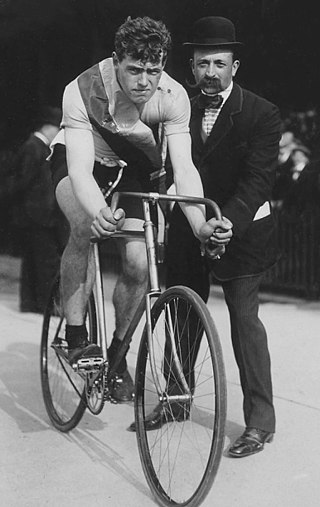
The men's 1000 metre sprint was one of seven track cycling events on the Cycling at the 1908 Summer Olympics programme. Its distance was the second shortest of the individual event distances. Each nation could enter up to 12 cyclists.
The men's 2000 metre tandem was one of seven track cycling events on the Cycling at the 1908 Summer Olympics programme. Each nation could enter up to 6 teams of 2.
The men's team pursuit was one of seven track cycling events on the Cycling at the 1908 Summer Olympics programme. It was the first appearance of a pursuit-style event. Each nation could enter 1 team of 4 cyclists.
The men's 1500 metre freestyle was one of 6 swimming events on the swimming at the 1908 Summer Olympics programme. Its distance was the longest of the 3 individual freestyle event distances. The competition was held from Tuesday July 21, 1908, to Saturday July 25, 1908.
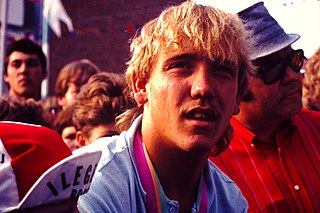
The men's points race was an event at the 1984 Summer Olympics in Los Angeles, California, for which the final was held on August 3, 1984. There were 43 participants from 25 nations. Each nation was limited to 2 cyclists. 24 cyclists competed in the final after two semifinals. The event was won by Roger Ilegems of Belgium, with Uwe Messerschmidt taking silver and José Youshimatz of Mexico bronze. It was the first medal in the event for each nation, none of which had competed in the previous edition in 1900.

The men's points race was an event at the 1988 Summer Olympics in Seoul, South Korea, for which the final was held on 24 September 1988. There were 34 participants from 34 nations, with 24 cyclists competing in the final. Each nation was limited to 1 cyclist in the event. The event was won by Dan Frost of Denmark, with Leo Peelen of the Netherlands taking silver and Marat Ganeyev of the Soviet Union bronze. It was the first medal in the men's points race for each of the three nations.

The men's points race was an event at the 1992 Summer Olympics in Barcelona, Spain. There were 38 competitors from 38 nations, with 24 cyclists competing in the final. Each nation was limited to one cyclist in the event. The event was won by Giovanni Lombardi of Italy, the nation's first victory in the event since 1900 and second victory overall; Italy was the first nation to have two wins in the men's points race. Léon van Bon gave the Netherlands its second consecutive silver in the event. Bronze went to Cédric Mathy of Belgium.

The men's points race was an event at the 1996 Summer Olympics in Atlanta, Georgia. There were 28 participants from 28 nations, with 24 cyclists completing the final, which was held on July 28, 1996. Each nation was limited to one cyclist in the event. The event was won by Silvio Martinello of Italy, the nation's second consecutive and third overall victory in the men's points race. Silver went to Brian Walton of Canada and bronze to Stuart O'Grady of Australia; it was the first medal in the event for both nations.
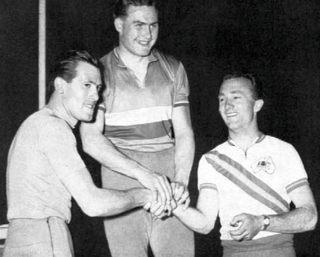
The men's sprint or "scratch race" at the 1956 Summer Olympics in Melbourne, Australia, was held from 3 to 6 December 1956. There were 18 participants representing 18 nations in competition, with one additional non-starter. Each nation was limited to one cyclist. The event was won by Michel Rousseau of France, the nation's first victory in the men's sprint since 1928 and fifth overall. Guglielmo Pesenti of Italy earned silver and Dick Ploog of Australia finished third for bronze.
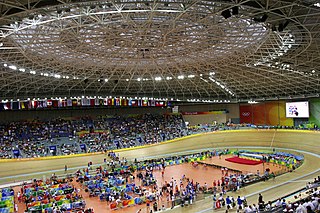
The men's sprint at the 2008 Summer Olympics took place on August 17–19 at the Laoshan Velodrome. There were 21 competitors from 15 nations, with each nation limited to two cyclists. The event was won by Chris Hoy of Great Britain, the nation's first victory in the men's sprint and first medal in the event since 1948. He faced his teammate Jason Kenny in the final, the first time since 1984 that one nation had taken the top two spots. Mickaël Bourgain of France earned bronze. Germany's four-Games podium streak ended.

The men's sprint cycling event at the 1932 Summer Olympics took place on August 1 and 3. The format was a sprint of 1000 metres. There were nine competitors from nine nations, with each nation limited to one cyclist. The event was won by Jacobus van Egmond of the Netherlands, the nation's second victory in the men's sprint. It was the fourth consecutive Games that the Netherlands reached the podium in the event. France made the podium for the third consecutive Games, with Louis Chaillot taking silver. Bruno Pellizzari gave Italy its first men's sprint medal with his bronze.

The men's individual road race at the 1948 Summer Olympics was held on an 11.45 km course. The course was circled seventeen times, so the total length of the competition was 194.6 km. There were 141 entries from 31 nations and 101 participants from 29 nations. Of the 101 starters, 28 rode the distance to the end. The event was won by José Beyaert of France, the nation's second consecutive victory in the men's individual road race. The Netherlands and Belgium won their first medals in the event, with Gerrit Voorting's silver and Lode Wouters's bronze, respectively.

The men's sprint cycling event at the 1948 Summer Olympics took place between 7 and 9 August and was one of six events at the 1948 Olympics. There were 23 cyclists from 23 nations, with each nation limited to one competitor. The event was won by Mario Ghella of Italy, the nation's first victory in the men's sprint. Reg Harris of Great Britain, heavily favored coming into the event, finished with silver, the first medal for a British cyclist in the sprint since 1920. Axel Schandorff's bronze was Denmark's first medal in the event since 1928. The podium streaks of the Netherlands and France both ended, with neither nation's cyclist able to advance to the quarterfinals.
